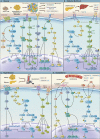Metabolic Syndrome and Breast Cancer: Prevalence, Treatment Response, and Prognosis
- PMID: 33842335
- PMCID: PMC8027241
- DOI: 10.3389/fonc.2021.629666
Metabolic Syndrome and Breast Cancer: Prevalence, Treatment Response, and Prognosis
Abstract
Metabolic syndrome is a type of multifactorial metabolic disease with the presence of at least three factors: obesity, diabetes mellitus, low high-density lipoprotein, hypertriglyceridemia, and hypertension. Recent studies have shown that metabolic syndrome and its related components exert a significant impact on the initiation, progression, treatment response, and prognosis of breast cancer. Metabolic abnormalities not only increase the disease risk and aggravate tumor progression but also lead to unfavorable treatment responses and more treatment side effects. Moreover, biochemical reactions caused by the imbalance of these metabolic components affect both the host general state and organ-specific tumor microenvironment, resulting in increased rates of recurrence and mortality. Therefore, this review discusses the recent advances in the association of metabolic syndrome and breast cancer, providing potential novel therapeutic targets and intervention strategies to improve breast cancer outcome.
Keywords: breast cancer; incidence; metabolic syndrome; obesity; prognosis; treatment response.
Copyright © 2021 Dong, Wang, Shen and Chen.
Conflict of interest statement
The authors declare that the research was conducted in the absence of any commercial or financial relationships that could be construed as a potential conflict of interest.
Figures


Similar articles
-
Association between metabolic syndrome, obesity, diabetes mellitus and oncological outcomes of bladder cancer: a systematic review.Int J Urol. 2015 Jan;22(1):22-32. doi: 10.1111/iju.12644. Epub 2014 Oct 23. Int J Urol. 2015. PMID: 25345683 Review.
-
Feeding the critically ill obese patient: a systematic review protocol.JBI Database System Rev Implement Rep. 2015 Oct;13(10):95-109. doi: 10.11124/jbisrir-2015-2458. JBI Database System Rev Implement Rep. 2015. PMID: 26571286
-
The molecular mechanisms between metabolic syndrome and breast cancer.Biochem Biophys Res Commun. 2016 Mar 18;471(4):391-5. doi: 10.1016/j.bbrc.2016.02.034. Epub 2016 Feb 15. Biochem Biophys Res Commun. 2016. PMID: 26891869 Review.
-
Adiposity, type 2 diabetes and the metabolic syndrome in breast cancer.Obes Rev. 2007 Sep;8(5):395-408. doi: 10.1111/j.1467-789X.2007.00396.x. Obes Rev. 2007. PMID: 17716297 Review.
-
Metabolic syndrome and postmenopausal breast cancer in the ORDET cohort: a nested case-control study.Nutr Metab Cardiovasc Dis. 2010 Jan;20(1):41-8. doi: 10.1016/j.numecd.2009.02.006. Epub 2009 Apr 10. Nutr Metab Cardiovasc Dis. 2010. PMID: 19361966 Free PMC article.
Cited by
-
Extracellular vesicles and particles as mediators of long-range communication in cancer: connecting biological function to clinical applications.Extracell Vesicles Circ Nucl Acids. 2023 Sep;4(3):461-485. doi: 10.20517/evcna.2023.37. Epub 2023 Aug 16. Extracell Vesicles Circ Nucl Acids. 2023. PMID: 38707985 Free PMC article.
-
MHIF-MSEA: a novel model of miRNA set enrichment analysis based on multi-source heterogeneous information fusion.Front Genet. 2024 Mar 22;15:1375148. doi: 10.3389/fgene.2024.1375148. eCollection 2024. Front Genet. 2024. PMID: 38586586 Free PMC article.
-
Effect of Walking Steps Measured by a Wearable Activity Tracker on Improving Components of Metabolic Syndrome: A Prospective Study.Int J Environ Res Public Health. 2022 Apr 29;19(9):5433. doi: 10.3390/ijerph19095433. Int J Environ Res Public Health. 2022. PMID: 35564828 Free PMC article.
-
Relationship of Inflammatory Markers and Metabolic Syndrome in Postmenopausal Women.Metabolites. 2022 Jan 13;12(1):73. doi: 10.3390/metabo12010073. Metabolites. 2022. PMID: 35050195 Free PMC article.
-
Prevalence, trend and associated factors of obesity-related cancers among U.S. adults with metabolic syndrome: Evidence from the National Health and Nutrition Examination Survey 2001-2018.PLoS One. 2023 Sep 1;18(9):e0290994. doi: 10.1371/journal.pone.0290994. eCollection 2023. PLoS One. 2023. PMID: 37656713 Free PMC article.
References
Publication types
LinkOut - more resources
Full Text Sources
Other Literature Sources

